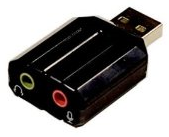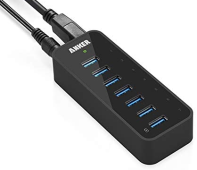
USB Sound Card Considerations
USB Port Placement

Most USB External Soundcards do not have a unique serial number encoded into the hardware. Windows can identify the brand and model but that is about it.
Things To Consider
- Windows tends to associate the USB Device to a physical USB port. If you have multiple connected USB External Soundcards, when you un-plug then re-plug these devices, try to plug each one into the SAME physical USB port every time.
- It might be helpful to affix a label to each of these devices to identify it and mark it with an identifer (A,B,C,etc.). Then keep a mapping list in a file to map physical ports to physical soundcards.
- Go to Tools > Outputs/Devices > View Output Groups and Devices to see a full listing of the current setup. Save it to a file so you can compare it when changes are made to physical device connections.
- Output Groups keep a list of Device Ids for the devices that it contains.
- Moving a Soundcard from one USB port to another will likely change the Device Name and Id. So it will appear to Windows to be a new device.
- USB Hubs with power cords are better than those without power cords (more reliable performance).

Identical USB soundcards
When you plug a USB soundcard into a USB port for the first time, Windows will install the device (via plug and play) and assign it a System Name (ex. "Generic USB Audio Device"). If you have several of the same USB soundcards, the Windows System Name will have a number added (see Listing 1 example). Actual naming convention for System Name differs by Windows OS version. And each soundcard will have a different Id derived from the name.
Listing 1. Identical USB external soundcards plugged into different ports.USB Port 1: Speakers (Generic USB Audio Dev, Id=886462652073781555 USB Port 2: Speakers (2- Generic USB Audio , Id=937430947834167215 USB Port 3: Speakers (3- Generic USB Audio , Id=921134518248621617
Review Output Groups when Devices Change
Always review your Output Groups after adding, removing or moving USB devices to different USB ports since Device Ids can change. Make sure the sound is being directed where you want it to go. Go to Tools > Outputs/Devices > View Output Groups and Devices and review all the devices configuration. When you verify it is all working properly, save a copy of the configuration to a text file for future reference.
Sound Quality Tip: For best quality sound on these adapters, try these settings. Not all soundcards may have these options.
- Go to Windows Control Panel > Sound.
- Select the USB adapter.
- Click Properties.
- Click the Enhancements tab. Check Bass Boost and Virtual Surround.
- Click the Advanced tab. From the Default Format drop-down menu, pick 16 bit, 48KHz (DVD Quality). But 44KHz (CD Quality) is good too.
 Page Bottom
Page Bottom To Page Top
To Page Top